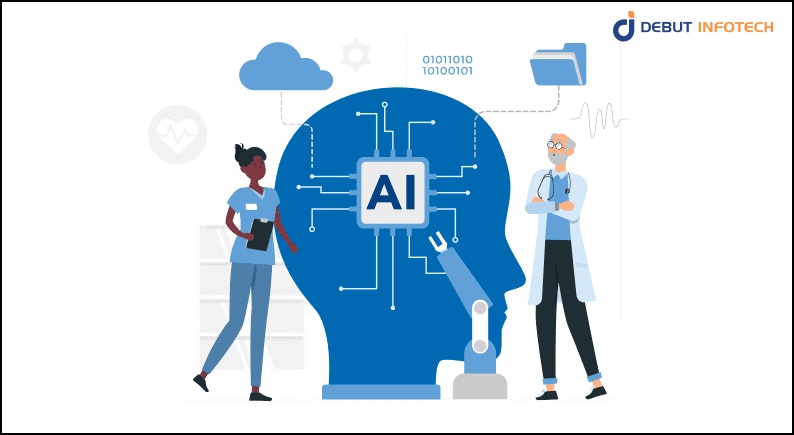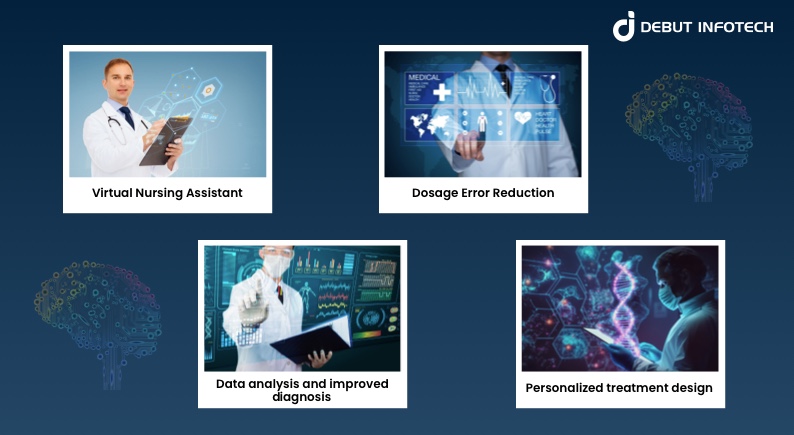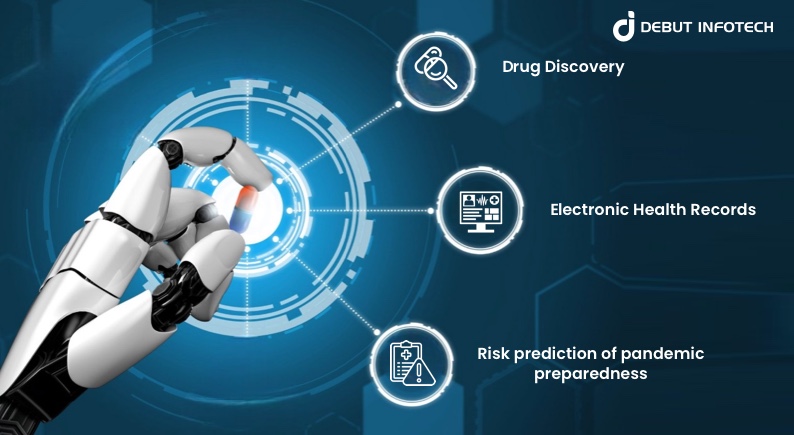Table of Contents
AI In Healthcare: Innovative Use Cases and Applications
March 18, 2024

March 18, 2024
The task of integrating artificial intelligence (AI) into the healthcare has been a very transformative one. Artificial intelligence development is not only used for improving and also optimizing the processes, it has also made them possible. Artificial intelligence in healthcare makes it possible to analyze the enormous amount of health data from the clinical studies to information on genetics and also interpret and assess the data much faster and also more efficiently than people can. AI is restructuring and renewing the contemporary healthcare by the means of machines that can acquire knowledge, understand, predict, and also act.
One of the transformative influences of AI, which stands out is that it can process the large amounts of data, distinguish patterns, and make precise and wise predictions. This has been realized in making the diagnosis, treatment and also research in healthcare, as well as providing care to the patients. AI allows for higher accuracy, efficiency, and also better outcomes in the healthcare sector.
What Is AI?

AI is a simulation of human intelligence by machines. AI can achieve specific goals by rationalizing and taking actions based on the data it was trained with or learned from. It is a field that combines computer science with the use of large datasets to solve problems. In the field of AI, there are other fields like Machine learning and deep learning.
Machine learning (ML) is a subset of AI – It is a concept that, without the help of humans, computer programs can automatically learn and adapt to new data. When computer programs absorb a large chunk of unstructured data, and these programs automatically retain it to carry out specific tasks, this is called deep learning.
The principle of AI is that the machines are programmed so as to mimic how the human intelligence is defined and use it to carry out simple or complex tasks. AI is a very human simulation of the cognitive functions. The area of artificial intelligence has witnessed the tremendous development in the domain of imitating the human actions such as learning, reasoning and perception by researchers and developers. Back then, complex tasks such as reasoning and decision-making used to be perceived as the exclusive domain of the human beings. Today, such difficult activities are performed by AI computer systems.
In the field of AI development company, there are speculations that innovators are likely to be able to develop systems that exceed the capacity of humans to reason or learn from any subject at all. Still, some believe this will be difficult because all cognitive activities are based on the value judgment of humans, which are subject to their experiences. AI performs tasks commonly related to human mental activities like identifying patterns, playing games, interpreting speech, etc., by processing enormous amounts of data. AI learns to carry out these tasks, looking for patterns to model during their decision-making process. In some cases, humans supervise the AI learning process, and in some cases, AI systems are trained to learn without supervision.
Related Read: The Role Of AI in Revolutionizing Healthcare.
Benefits of AI in Healthcare

AI can be used in several industries like Healthcare. Some of the benefits of AI in Healthcare are listed below:
Virtual Nursing Assistant
Virtual nursing assistants are AI-powered apps, chatbots, interfaces, etc. Information regarding patients’ health is gathered daily using a virtual nursing assistant. These AI-powered tools are used to answer questions based on medications. The reports are submitted to doctors, and the tools help schedule a meeting with a health practitioner. Patient Information is gathered for doctors’ use even without meeting with patients face-to-face. Using virtual nursing assistants, patient care tasks can be carried out, including mapping improvement, routine information, analysis of symptoms, etc., helping practitioners save ample time and focus on patients’ critical vulnerabilities.
Nurses struggle to devote time to each patient when there are large numbers of patients to attend to. This might lead a patient to leave the hospital because they were not attended to. Virtual nursing assistants can significantly avoid patient leakage during peak hours.
Using artificial intelligence in health care, equal importance is given to each patient. Virtual assistants can collect basic information such as pulse rate, height, and more while the patient waits to meet the doctor. This will boost the patient satisfaction level and save the doctors time. With the help of virtual nursing assistants, nurses in healthcare organizations will not feel burned out. With the help of nursing assistants, several tasks carried out by nurses can be automated. Nurses can devote their time to high-intensity patient care tasks that need a human touch.
Dosage Error Reduction
Dosage error reduction is one of the benefits of AI in healthcare. It uses a sensor tracking system adapted from previously used technology to monitor people’s sleeping positions. A patient’s movements are tracked within a ten-meter radius using radio waves that reflect off their body. The signs of a patient self-administering an inhaler or insulin pen reflect signals analyzed by AI. Finally, when it detects an error in the patient’s self-administration, the system alerts the patient or their healthcare provider.
The new sensor sits in the background at home, like a Wi-Fi router, and the team developed a neural network to key in on patterns indicating the use of an inhaler or insulin pen. By performing example movements, some relevant (e.g., using an inhaler) and some not (e.g., drinking or eating), the network is trained and then learns from this pattern. The network successfully detected 96 percent of insulin pen administrations and 99 percent of inhaler use through reinforcement and repetition.
Data analysis and improved diagnosis
Data analysis, as a benefit of AI in healthcare, is a transforming force, surpassing human capabilities in efficiency and speed across various domains. In healthcare, it is an invaluable tool. By swiftly sifting through vast repositories of clinical studies, medical records, and genetic information, with enormous volumes and complex data, AI can extract essential insights that might be difficult for humans to observe easily.
This technological advancement holds a formidable promise in terms of medical diagnosis. For example, if a patient suffers from a complex set of symptoms that are difficult to analyze by a specialist, the traditional diagnostic approaches could include a time-consuming manual review of medical histories, literature consultation, and collaboration between specialists. But with AI-powered systems, this process will enhanced by rapidly cross-referencing the patient’s data against a comprehensive database of medical knowledge.
Finally, in medical diagnosis, the AI role goes beyond just speed; it enhances human expertise, giving clinicians invaluable support in navigating the complexities of modern healthcare. Medical professionals can make more informed decisions, leading to augmented patient outcomes and enhanced healthcare delivery by relying on AI analytic abilities.
Personalized treatment design
One significant benefit of AI in healthcare is that it can learn and retain references, creating an avenue for personalized treatments in real-time. The future of AI in healthcare is promising if, for instance in the future, healthcare services can provide patients with 24-hour access to a virtual assistant powered by AI. Inquiries would be addressed based on the patient’s medical history, preferences, and individual needs, offering customized guidance and support whenever required. Such innovations promise to transform patient care, ensuring that individuals receive timely and personalized interventions that align with their unique health profiles.
AI Use Cases In Healthcare

Drug Discovery
Developing new drugs for clinical trials is a time-consuming and costly endeavor. However, the ability to enable healthcare experts to analyze existing medications and reformulate them to combat specific diseases is one of the distinctive advantages of AI use cases in healthcare. This innovative approach significantly reduces the expenses associated with drug development. Through the application of machine learning algorithms for the analysis of extensive datasets, AI has accelerated the target identification process.
For instance, machine learning can delve into vast genomic data related to a disease, identify potential drug targets, and predict drug efficacy. Furthermore, these algorithms can dissect scientific literature, identifying promising drug targets and aiding the discovery of genetic biomarkers for disease assessment.
Electronic Health Records
Electronic health records (EHRs) are vital to modern healthcare delivery. AI technology is becoming increasingly essential in the management of EHRs. Analyzing large volumes of data to identify patterns and trends to help prevent and treat diseases is a process medical practitioners can use. AI algorithms can analyze EHR data and identify patterns and trends. This can help medical professionals identify patients at high risk of developing certain diseases and develop customized care and prevention ways.
For example, AI can analyze patient data such as medical history, lifestyle factors, and genetic information to predict the risk of developing certain diseases like diabetes and heart disease. AI can also analyze medication data to identify patterns that can lead to adverse drug reactions and suggest alternative treatments.
Risk prediction of pandemic preparedness
AI models have become valuable for scientists studying the societal-scale effects of catastrophic events, such as pandemics. Generative AI can simulate how an infectious disease might spread across different populations. Under various conditions, this can be achieved by relying on advanced algorithms and enormous datasets. With the help of these models, key factors contributing to the rapid escalation of a virus can easily be identified. This will aid and enable policymakers and healthcare organizations to develop targeted preventive measures and response strategies.
For example, the AI model might reveal a higher likelihood of a severe influenza outbreak during the upcoming flu season because an area is densely populated and has low vaccination rates and frequent international travel. This information can prompt health authorities to allocate additional vaccine doses to the region, implement targeted public health campaigns, and enhance monitoring efforts, thereby reducing the outbreak’s potential impact.
Conclusion
In summary, AI, being a computer system used to simulate human cognitive activities, has played a very transformative role in healthcare by helping to carry out complex tasks like reasoning, decision-making, etc., which, in essence, accelerates efficacy and increases productivity by allowing practitioners to be able to focus on more patients care with high-intensity.
FAQs: AI In Healthcare
A. AI is a simulation of human intelligence by machines. The principle behind AI is that machines copy how human intelligence is defined and use it to carry out simple or complex tasks.
A. Virtual nursing assistance is an AI-powered tool used to answer questions based on medication. Information such as pulse rate, height, etc, can be collected, reducing the stress of practitioners and enabling them to focus on tasks that require one-to-one meetings with patients.
A. AI in healthcare augments and improves processes. It has also unveiled new possibilities. AI in healthcare helps analyze a large volume of health data from clinical studies and information based on genetics, translating and interpreting the data faster and more efficiently than humans.
A. Deep learning algorithms for greater diagnostic accuracy, AI-driven precision medicine, sophisticated robotic surgery, virtual reality for better patient involvement, and AI-powered genomics for personalized medicine are some of the future uses of AI in healthcare.
A. By reducing administrative work, allocating resources more efficiently, preventing medical errors through predictive analytics, assisting in early disease detection and intervention, and encouraging preventive care practices, artificial intelligence (AI) helps lower healthcare costs. All of these factors eventually result in more effective and economical healthcare delivery.
Our Latest Insights



Leave a Comment